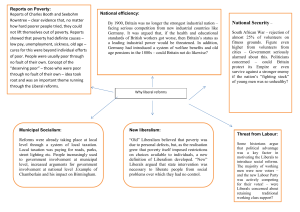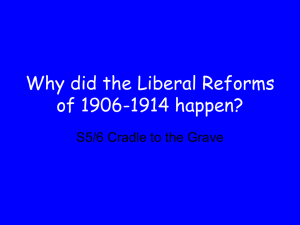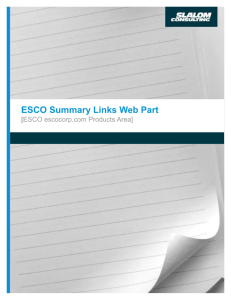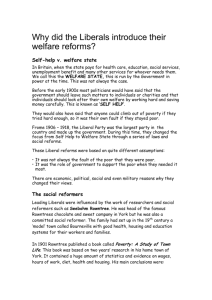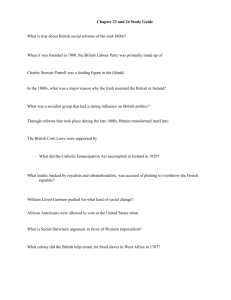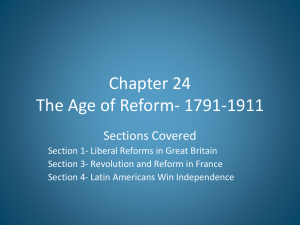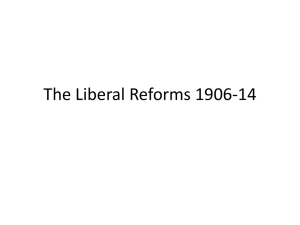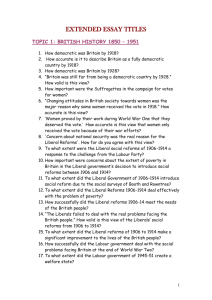Britain 1906-1918 The National Archives Education Service Background and Big
advertisement
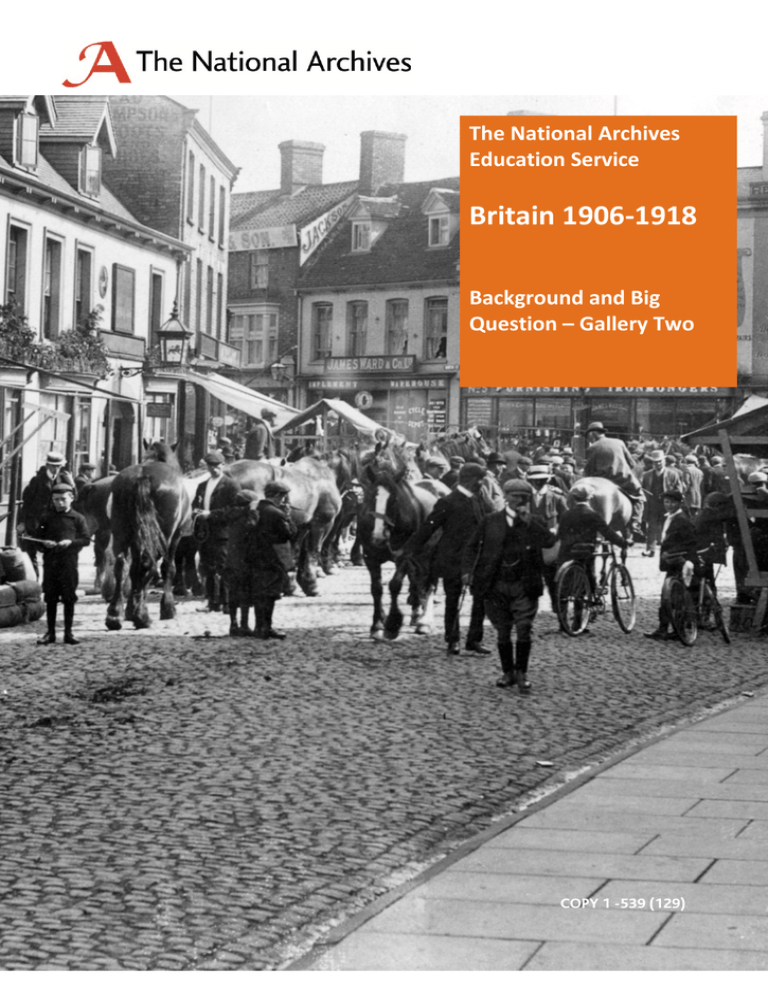
The National Archives Education Service Britain 1906-1918 Background and Big Question – Gallery Two COPY 1 -539 (129) Britain 1906-1918 Gallery 2 Background Contents CONTENTS .............................................................................................................................................................................................2 GALLERY BACKGROUND .....................................................................................................................................................................3 INTRODUCTION: WHAT WERE THE LIBERALS TRYING TO ACHIEVE? ............................................................................................................. 3 CRITICS OF THE LIBERAL REFORMS ..................................................................................................................................................................... 3 THE LIBERAL REFORMS AND WORKING PEOPLE................................................................................................................................................ 5 SOURCES.................................................................................................................................................................................................6 BACKGROUND SOURCE 1 ....................................................................................................................................................................................... 6 BACKGROUND SOURCE 2 ....................................................................................................................................................................................... 8 BACKGROUND SOURCE 3 .....................................................................................................................................................................................10 BACKGROUND SOURCE 4 .....................................................................................................................................................................................12 BACKGROUND SOURCE 5 .....................................................................................................................................................................................13 GALLERY TWO: THE BIG QUESTION.......................................................................................................................................... 14 2 www.nationalarchives.gov.uk/education/ Britain 1906-1918 Gallery 2 Background Gallery Background Introduction: What were the Liberals trying to achieve? This is a really difficult question. Lots of brilliant historians in universities have argued about this for many years and they still cannot agree. The main arguments go something like this: Some historians believe that the Liberal reforms of 1906 onwards laid the foundations of the welfare state today. These historians believe that Lloyd George's reforms made changed attitudes. They convinced people that governments should help the poor and needy. This made it possible for later governments to bring in reforms like the National Health Service (in 1948). Other historians see the Liberal reforms in very different terms. They believe that the Liberals were only interested in Britain's efficiency as a country. They brought in their welfare reforms because they were afraid that a sick and badly educated workforce would leave Britain lagging behind other countries like Germany. Another view of the Liberal reforms is that they did not really have any plans at all. Some historians believe that the Liberals discovered a wide range of social problems once they came to power. They did not really have a clear plan on what to do so they adopted measures that seemed sensible as they went along. Whatever the thinking behind the reforms, there is no doubt that they were controversial and also had some important effects. Critics of the Liberal reforms It may seem strange today but at the time of the Liberal reforms there was a lot of opposition to them. Many people in society as a whole still believed that it was the job of the individuals and their families to look after themselves. They were worried that if the state gave too much help to poor families then they would become lazy and expect the state to provide everything for them. Another factor that brought criticism was the cost of the reforms. The most spectacular example of this came in the years 1908-11. In 1908 the Liberals introduced Old Age Pensions. In 1909 the Liberal Chancellor of the Exchequer, David Lloyd George, introduced what he called the People's Budget. In simple terms, this budget put taxes on to the wealthy to pay for welfare reforms like pensions. Lloyd George disliked the wealthy and was very happy to upset them by passing measures like the People's Budget. The Budget caused outrage. The House of Lords opposed it. They threw out the Budget even though the elected MPs in the House of Commons had approved it. This led to another election, which the Liberals won. The Liberals then passed the Budget and passed the Parliament Act (1911), which greatly reduced the power of the House of Lords. Background source 1 An extract from a letter from the Board of Education to the Monmouthshire County Council, 1904 (ED 125/11) There were other critics of the reforms as well. The British Medical Association (which represented the doctors) often criticised the National Health Insurance Act and the provisions for school medical 3 www.nationalarchives.gov.uk/education/ Britain 1906-1918 Gallery 2 Background inspections and treatment. It should be said that they usually criticised the way the measures worked, rather than the measures themselves. Trade unions and friendly societies also criticised the detailed workings of the reforms, even though they supported the reforms themselves. For example, Friendly Societies complained that the doctors who gave treatment under National Health Insurance were not always the highest quality. Trade unions often complained the Old Age Pension was not high enough. One surprising group of critics were ordinary working people. They disliked having to pay 4d. a week out of their wages for National Insurance. There were many campaigns to get certain trades made exempt (e.g. domestic servants). However, once people saw the benefits of National Insurance health care and unemployment pay - the criticisms grew less. The Liberal reforms and young people The reports and investigations which you may have studied in Gallery 1 showed the Liberals that they had to do something about children's health, education and general welfare. They brought in a range of important measures. In 1906 they brought in the Education (School Meals) Act. This gave local councils the power to provide free school meals for the poorest families. In many ways this was a great success. By 1914 158,000 children were receiving free meals. On the other hand, the Act allowed local authorities to provide meals, but it did not make them do so. Also, the councils had to raise the money for meals from their local ratepayers. In 1907 the Liberals introduced compulsory medical inspections. The checks were free, but in some areas they were carried out more thoroughly than others. Another problem was that treatment was not free. This changed in 1912 when school clinics were introduced to provide free treatment for children. Background source 2 Police notice from 1909 warning people about the terms of the new Children Act (MEPO 2/1138) In 1908 the government introduced the Children and Young Persons Act, usually known as the Children's Act. Children became protected persons, which meant that parents who ill-treated or neglected their children could now be prosecuted. The Act also banned the sale of alcohol and tobacco to children and banned them from working in dangerous trades like scrap metal. Also, children who broke the law were now dealt with in specialist juvenile courts and prisons. The Liberal reforms and old people The Liberals were fully aware that for most people the main cause of poverty was old age. As a result they introduced Old Age Pensions in 1908. It was highly controversial because of the expected cost. It was also controversial because some people thought that old people in poverty were only poor because they had wasted their money all their lives. Overall, the pension was very well received and had support from most people. To qualify, people had to be over the age of 70. They also had to earn less than £31 per year and have lived in Britain for 20 years. Criminals and anyone who was felt to be idle did not qualify either. A single pensioner got 2 shillings a week, while a married couple got 7s. 6d. It was not a fortune but it was a lot better than nothing. It was also costly. The government spent millions each year on pensions. 4 www.nationalarchives.gov.uk/education/ Britain 1906-1918 Gallery 2 Background Background source 3 Extract from a government document setting out what the likely cost of pensions would be in the year 1911-12 (AST 15/48) The number of old people who depended on charity or the Poor Law dropped dramatically. Even so, there were still many thousands of old people who did depend on the workhouse for somewhere to live. This was usually because they had no family to live with and the pension on its own was not enough for an old person to pay rent, bills and food. Background source 4 Old Age Pensioners meeting Liberal Chancellor of the Exchequer David Lloyd George in 1910 (© Llyfrgell Genedlaethol Cymru / The National Library of Wales 2002: PZ4257) The Liberal reforms and working people Some of the most far-reaching reforms brought in by the Liberals concerned working people. Throughout the early 1900s there were many different measures taken by local authorities to help the sick and unemployed. The government supported many. However, by 1911 the Liberals were convinced that some kind of government-controlled national system was needed. As a result they introduced National Insurance in 1911. The National Insurance Act was in two parts. Part 1 dealt with unemployment. Part 2 dealt with health. Workers earning under £160 per year had to join the scheme. They paid 4d. per week from their own wages into an insurance scheme. Each payment gave them a stamp in their card. The employer added a further 2d. and the government added 3d. on top of that. When the scheme was introduced there was a lot of opposition. Many workers resented the money being taken from their wages. Many employers resented the amount of money it cost them. In return for their contributions workers got sick pay (10 shillings a week for 6 months) and unemployment pay (7 shillings a week for up to 15 weeks). As with the other Liberal measures, National Insurance helped but it was far from perfect. There were some problems with the organisation and standard of medical care under the scheme. There was always the problem of the families of workers. They were not insured or treated under the scheme if they were ill. Background source 5 A letter to Liberal politician David Lloyd George from the National Association of Domestic Servants complaining about the introduction of National Insurance, 1911 (T 172/49) 5 www.nationalarchives.gov.uk/education/ Britain 1906-1918 Gallery 2 Background Sources Background Source 1 An extract from a letter from the Board of Education to the Monmouthshire County Council, 1904 (ED 125/11) 6 www.nationalarchives.gov.uk/education/ Britain 1906-1918 Gallery 2 Background Transcript In reply to Mr. Hall's letter of the 5th instant I am directed to state that the Board of Education have under consideration the proposal of your Authority to provide spectacles to children attending Public Elementary Schools in cases where the parents are too poor to pay for them. This Board attach much importance to the following points:1. It must be ascertained that the provision of spectacles is the best way of meeting the defect in the children and is therefore absolutely necessary. 2. Adequate security must be provided that the prescription of spectacles is strictly appropriate to the optical needs of each particular child. 3. The spectacles provided should be simple and inexpensive. 4. It should be ascertained that there are no local voluntary agencies which the Local Education Authority may encourage and assist before undertaking the total cost themselves. 5. It should be ascertained that the parents are unable to provide suitable glasses for their children. * 7 www.nationalarchives.gov.uk/education/ Britain 1906-1918 Gallery 2 Background Background Source 2 Police notice from 1909 warning people about the terms of the new Children Act (MEPO 2/1138) 8 www.nationalarchives.gov.uk/education/ Britain 1906-1918 Gallery 2 Background Transcript PUBLIC WARNING. CHILDREN ACT, 1908. Among other provisions of the Children Act, Parents or other persons having the charge of Children are made liable to fines or other penalties for 1. Leaving a child under the age of 7 in a room with a fire without a fireguard, or without taking other precautions, if the child is burned to death or seriously injured. 2. Taking or sending a child under the age of 14 into the drinking bar of a public-house, or any part of the premises exclusively or mainly used for the sale and consumption of intoxicating liquor. 3. Giving to a child under the age of 5 any intoxicating liquor (except in cases of illness, &c.) Persons, other than relatives, undertaking for payment, and for more than 48 hours, the care of one or more infants under the age of 7 away from their parents, must send notice of the fact to the Clerk to the Board of Guardians (in London to the Clerk to the London County Council, Spring Gardens, S.W.; in Scotland, to the Clerk to the Parish Council). Exceptions may be made where the infants have been boarded out by a charitable society. PAWNBROKERS must not accept goods from children under 14 (in London and Liverpool, under 16). DEALERS IN OLD METAL must not buy from children under 16. TOBACCONISTS must not sell to persons under 16 cigarettes or cigarette papers (nor any other tobacco if there is reason to believe it is for the use of the person under 16). This does not apply to boys employed in the trade or to boy messengers in uniform employed by messenger companies. Persons giving entertainment to children, where there are more than a hundred children and any of them go up a staircase to their seats, must have a sufficient number of grown-up attendants to secure the safety of the children in case of fire, &c. This does not apply to entertainments in private houses. The Act is in force from April 1st, 1909. Home Office, 24th March, 1909. 9 www.nationalarchives.gov.uk/education/ Britain 1906-1918 Gallery 2 Background Background Source 3 Extract from a government document setting out what the likely cost of pensions would be in the year 191112 (AST 15/48) 10 www.nationalarchives.gov.uk/education/ Britain 1906-1918 Gallery 2 Background Transcript The total number of pensioners that has to be provided for is therefore as follows: Total ordinary pensioners on 1st April 1911 744,000 Total pauper pensioners on 1st April 1911 200,000 Total net increase during the year 1911-12 40,000 984,000 The total cost on this basis works out to be £12,350,000. The Accounts of Local Committees are paid one quarter in arrear, and the estimate of £65,000 for expenses is based therefore on current expenditure to the 30th September 1910 with an addition to meet the extra expenditure that will be incurred in dealing with the cases of pauper claimants during March Quarter 1911. The total sum estimated to be required for Old Age Pensions for the year 1911-12 is £12,415,000. 11 www.nationalarchives.gov.uk/education/ Britain 1906-1918 Gallery 2 Background Background Source 4 Old Age Pensioners meeting Liberal Chancellor of the Exchequer David Lloyd George in 1910 (© Llyfrgell Genedlaethol Cymru / The National Library of Wales 2002: PZ4257) 12 www.nationalarchives.gov.uk/education/ Britain 1906-1918 Gallery 2 Background Background Source 5 A letter to Liberal politician David Lloyd George from the National Association of Domestic Servants complaining about the introduction of National Insurance, 1911 (T 172/49) 13 www.nationalarchives.gov.uk/education/ Britain 1906-1918 Gallery 2 Background Transcript Dear Sir, INSURANCE BILL. Referring to the above measure on behalf of our Members I shall be glad to know, if you can see your way clear, to have the Clauses relating to Domestic Servants deleted, or else let the Domestic Servants have the option of being included or not, as they think best. I am quite willing to believe, that when drafting the "Bill" you were prompted by the most humane consideration for the lot of the poor worker, and such consideration will always stand to your credit in the years to come. In the case of Domestic Servants, however, I and numbers of our Members really think your "Bill" will do us serious injury, just in the same way that it will injure Commercial Clerks, who (as a class) are well looked after by their employers. The benefits offered by the "Bill", are of small use, and the regulations are likely to destroy the friendly relationship that I am glad to say still prevails between Mistress and Maid in the majority of cases. I trust therefore, you will give the plea of our Members your serious consideration, and amend the bill as we respectfully suggest. I am, Dear Sir, Yours very truly, E Balfour SECRETARY The National Association of Domestic Servants 14 www.nationalarchives.gov.uk/education/ Britain 1906-1918 Gallery 2 Background Gallery two: The Big Question THE BIG QUESTION IN THIS GALLERY IS: WHAT WERE THE ACHIEVEMENTS OF THE LIBERAL WELFARE REFORMS 1906-14? It is early in 1914. You work for the government as a researcher and speechwriter. Your boss is the Chancellor of the Exchequer, David Lloyd George. He is not happy. That means you are not happy. z Since 1906 the government has introduced welfare reforms to help children, old people, unemployed and sick people. z Lloyd George has introduced the most radical Budget the country has ever seen to pay for the reforms. z Despite all this, people are criticising him and the Liberals. nbnbnbnbn Prepare a speech: Lloyd George wants to make a speech that will shut all the critics up. That’s where you come in. You have to research and help him write his speech. You will need to prepare three files: An Achievements File, which sets out evidence of what the Liberal reforms have achieved An Attack File, which sets out evidence that people should not listen to the critics of the Liberals An Awkward File, which sets out the areas where things have not gone well or need further work. You could use this format to gather together the points for each file and then present your views to Lloyd George. There are some Word files, with the table already in, that you can use. You can add extra sources and evidence by simply adding rows to the table. 15 www.nationalarchives.gov.uk/education/
